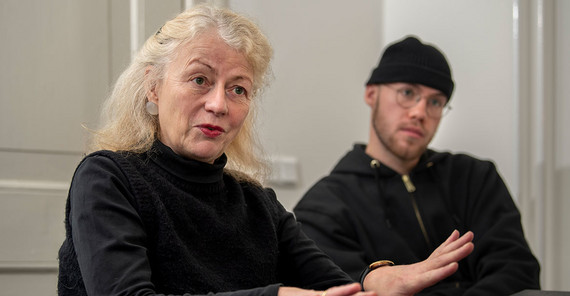Groundbreaking results
The MORE project compares different course models that teach Islam in German-speaking schools. Even before the final evaluation of the data collected, two different approaches can be identified: Denominational religious education depicts Islam as one of several religions, while the subject L-E-R approaches the subject via social issues from the students’ everyday lives. “Everyone really likes this,“ summarizes Stephanie von Steinsdorff
She has been working on the research project as a research assistant for the past two years – collecting data, conducting interviews, and familiarizing herself with various teaching models. “In Brandenburg, we have only observed very few Islamophobic statements. The vast majority show solidarity with their Muslim classmates,“ von Steinsdorff explains and attributes this to the concept of the subject L-E-R. Only in Brandenburg do Muslim, Protestant, and non-religious pupils learn together in one class. “In southern Germany, we had classes that could not relate to Islam at all,” adds her colleague Patrick Döring, who has started evaluating the data from the DFG-funded project. “Teachers in Brandenburg approach the pupils in a way that is completely different from that of their colleagues in Tübingen. Based on societal issues, we teach the perspective of Islam on everyday life,” Döring explains. “It is also about sensitive topics,“ von Steinsdorff adds. “What does terrorism have to do with Islam, for example? Teachers in Brandenburg have the confidence to address such questions. They have learnt how to prepare for this didactically in the L-E-R degree programs.” Döring reports on an opposite example from Tübingen. “There we saw anxious teachers who did not want to be sued by the parents. According to the motto: ‘Too much Islam is being taught, but we are Christians here!’”
Strengthening society with L-E-R
Project leader Marie-Luise Raters is delighted with how well the Brandenburg model performs in comparison to denominational religious education in the rest of Germany, Austria, and Switzerland. “Our teachers are open to problems, encourage debate, and don’t want to explain Islam as a religion.” For the researcher, this is the key finding from the research project. “With us, prospective teachers learn to debate without pigeonholing dissenting opinions,” Raters emphasizes. “They learn to use materials in the classroom that are based on facts and not on rumors or false information from social media.” Prof. Raters regards this as a core task for the social sciences. “My idea is to take Jürgen Habermas’ rules of discourse and develop them into an L-E-R method. Mutual respect becomes the interdisciplinary bracket of how everyone should treat each other, even in heated debates.” Raters does not yet know whether this will work, but it is certainly a motivation to further develop the school subject L-E-R.
“In any case, ideological reflection belongs into the upper secondary school,” she repeats her demand to politicians. “This also has something to do with brain development. Certain discussions are only possible at the age of 16 or 17 due to the structure of the brain.” Stephanie von Steinsdorff also advocates more recognition for the social sciences. “Politicians often think that it doesn’t create any added value to the economy, but it is important for the cohesion of society and would also pay off,” she is convinced.
Modernizing school lessons
Looking at German-speaking countries including Austria and Switzerland also allows the researchers to draw general conclusions about their own education system. “A lot of things are outdated and no longer meet modern standards,” Prof. Raters and her team summarize. “Our teachers do not work enough in an interdisciplinary way, and insufficiently problem-oriented. Due to the division of subjects, the German education system is lagging behind the British and the Danish,” von Steinsdorff emphasizes.
“Project work with meetings and exchanges of experience should be utilized more intensively.” Her colleague Döring is concerned about the teaching materials. “Textbooks can hardly be used anymore because they contain stereotyping photographs. Islam as a specter, for example,” he explains. “In general, it is difficult to find suitable materials for teaching Islam. Committed people look for relics at flea markets and set up a rummage table,” he describes the concept of meaning-based learning. “There are headscarves and black cubes that are supposed to represent the Kaaba – the building in the courtyard of the mosque in Mecca. Everyone can choose something. It is really popular.”
In general, both the curriculum and the degree program for L-E-R need to be revised. “The subject is completely overloaded: Religious studies, a focus on Christianity, ethics, Islam, comparative methods, Judaism, conflict management - something always falls by the wayside,” Prof. Raters emphasizes. Patrick Döring would like to investigate the extent to which the results of the DFG-funded project can help here. “Brandenburg is certainly very well positioned with the L-E-R school subject,” Raters summarizes. “More and more people want to study it at the University of Potsdam. There are currently 90 people in my introductory course; it was actually planned for 60. In the Master’s degree program, however, it looks different and many switch to Berlin,” she reports. “They want to teach at a high school later on. Which brings us back to the beginning: L-E-R urgently needs to be part of the upper secondary school curriculum in Brandenburg.”
The Researcher
Apl. Prof. Dr. Marie-Luise Raters researches and teaches at the Department of Lifestyle, Ethics, Religious Studies (LER)/ Department of Philosophy of the University of Potsdam.
Email: mlratersuuni-potsdampde
The Project
Models of Religious Education in Comparison: The Topic of "Islam" from the Perspective of Teachers and Students
Participants: University of Potsdam (Apl. Prof. Marie-Luise Raters), University of Tübingen, University of Vienna (Austria), University of Zurich (Switzerland)
Funding: Swiss National Science Foundation (SNF), Austrian Science Fund (FWF) and German Research Foundation (DFG)
Duration: 9/2021–8/2024
This text was published in the university magazine Portal Wissen - Eins 2024 „Bildung:digital“ (PDF).


